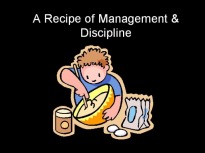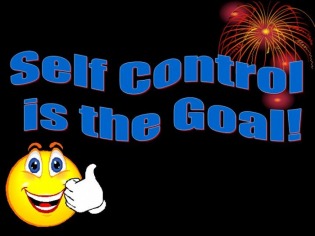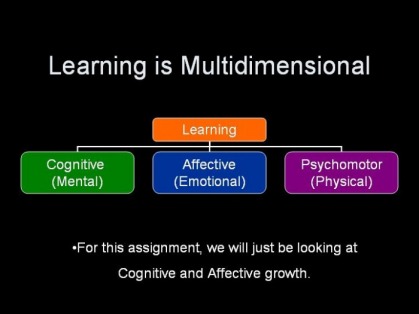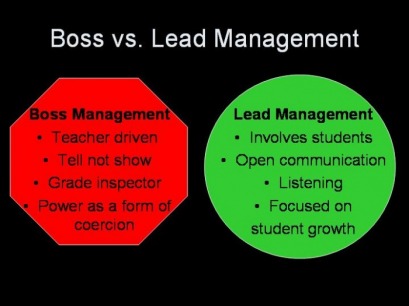Management & Discipline Defined

If looking at classroom success like a recipe, the proper understanding of management and discipline are the base by which all other ingredients are added. Along with instruction, it is the most pivotal aspect of a classroom.
Description:
To begin the explicit understanding of management and discipline, a proper definition is helpful. Tom Savage, author of Teaching Self-Control Through Management and Discipline, defines management as, “that aspect of your teaching that focuses on creating an environment and establishing goals that facilitate student success in achieving both academic and social goals” (1999). Therefore, the goal of management is to provide a worthwhile learning environment for the students. Similarly, Savage defines discipline as “the development of self-control, character, orderliness, and efficiency” (1999). One of the pivotal assertions in these definitions is that the classroom is not strictly about academics (though this is certainly essential). It entails the whole-development of the child.
Significance:
Many teachers are focused on lesson planning and instructional time when first entering a classroom. These are clearly vital, yet without a well managed classroom, nothing can be taught effectively. Developmentally speaking, learning is not only a cognitive (mental) task, but an affective (emotional and social) one as well. (Bjorklund, 2005) Thus, role of the teacher is two-fold. Instruction is one part. The other is spurring children toward greater self control. (Savage, 1999) This is where the field of management and discipline combines. By having a firm grasp on these concepts, the teacher is better equipped to serve his or her students.
Demonstration:
Think back to your favorite class. What were some of the characteristics of the environment you were in? Was it disheveled, disordered, inconsistent, and essentially a free-for-all? Likely not. Typically, the classes we remember enjoying most are those that are structured, with routines, goal-oriented, and expectations were defined. If you have ever been in a classroom like the first described, it may have been a memorable experience, but for all the wrong reasons, even if the instruction was well-delivered. Management and discipline make all the difference.
Integral concepts:
Management-
One of the most integral concepts of management is that it, “involves your exercise of classroom leadership, the facilitation of student motivation, the arrangement of the physical environment, management of time and lessons, and the attendance to principles of group dynamics” (Savage, 1999). All of these dimensions are affected by management. There are two types of management, boss and lead. Boss management is teacher driven; he or she sets the standards for the class. They also concentrate on telling, not showing, are grade inspectors, and use their power as a form of coercion, which may create a power struggle. Conversely, lead management involves students, teacher communication with students, listening and facilitating student growth (Savage, 1999). Lead management is considered a greater form of teaching as it involves the students in their learning, incorporating the affective domain of learning as well. It contributes to their total growth in a way that the “boss” does not.
Discipline-
The discipline domain includes, “direct teacher intervention, responding to persistent misbehavior, responding to serious behavior problems, and teaching conflict resolution” (Savage, 1999). (The response to misbehavior will be discussed in greater detail at a later point in this project.) The ability to discipline students in an appropriate and effective manner is key to preventing further issues and teaching self-control. “Self-control involves a consideration of individual motivations as well as the impact of the action on those in the social environment, It places individual needs in the context of a broader social context” (Savage, 1999). Because self-control is not something that comes naturally to humans, it needs to be taught in an effective manner. Therefore, discipline is not to be used as an oppressive tool, but an opportunity for growth.
Individualization:
I chose this as the most important concept because it is so foundational to teaching success. As new teachers, this is one of the most difficult concepts to master. (I have found this to be true of myself as well in the course of observations.) However, with the proper tools outlined in both books, the concepts of management and discipline shift from negative responsibilities to a positive tool. This view revolutionizes the class. In my own experience, I have been leery of the word discipline because of the images it conjures (and because it is difficult for me to be stern in general). However, when viewed in light of aiding the students’ development, I look forward to practicing and building my skills in this area.
Spiritual Application:
Self-control is an often stressed concept of Biblical living. One of the most recognizable verses regarding this is Galatians 5:22-24, the Fruit of the Spirit. “But the fruit of the Spirit is love, joy, peace, patience, kindness, goodness, faithfulness, gentleness,self-control; against such things there is no law. Now those who belong to Christ Jesus have crucified the flesh with its passions and desires.” Self control is part of the foundation of Christian life. It is essential to so many aspects of this, in abstaining from sin to disciplining oneself in their walk of faith. (See also Titus 1:7-9 and 1 Peter 1:5-7 for additional related verses.)



